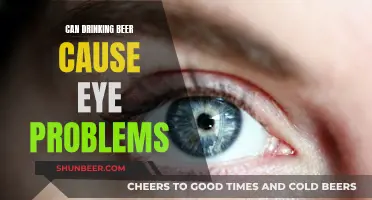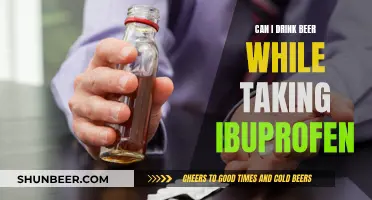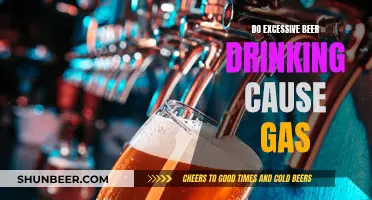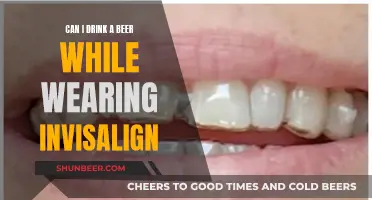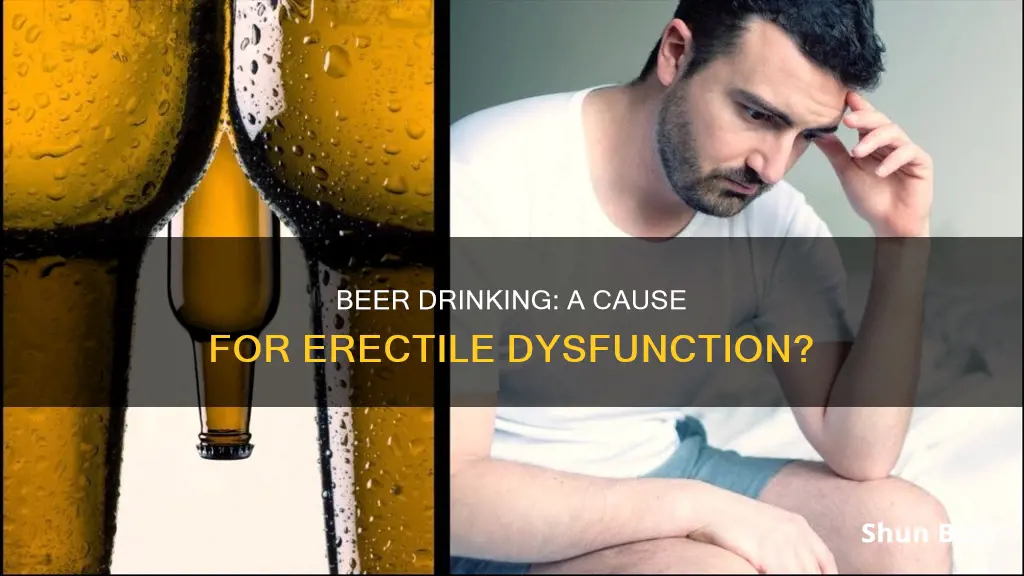
Alcohol and erectile dysfunction have a complex relationship. While a small amount of alcohol can increase sexual desire and reduce anxiety about sexual performance, excessive alcohol consumption can have the opposite effect. Alcohol is a depressant, slowing down the signals between the brain and body, including the penis, and affecting sexual function. It is also a diuretic, causing dehydration, which can reduce blood flow to the penis and make it more difficult to get an erection. Research has shown that there is a significant association between regular alcohol consumption and erectile dysfunction, with chronic heavy drinking leading to long-term erectile dysfunction.
| Characteristics | Values |
|---|---|
| Alcohol's effect on erectile dysfunction | Temporary erectile dysfunction can occur after drinking any type of alcohol. |
| Alcohol's effect on the body | Alcohol is a depressant that slows down the central nervous system, affecting the signals between the brain and the penis. |
| Alcohol is a diuretic, causing dehydration and increased urination, which can lead to decreased blood flow to the penis. | |
| Alcohol can increase levels of the hormone angiotensin, which is linked to erectile dysfunction. | |
| Alcohol can lower testosterone levels, impacting nitric oxide production, which is key to relaxing blood vessels in the penis. | |
| Chronic alcohol consumption can damage nerves, increase the risk of cardiovascular disease, and damage blood vessels, all of which can contribute to erectile dysfunction. | |
| Alcohol consumption and erectile dysfunction risk | Light to moderate alcohol consumption may reduce the risk of erectile dysfunction. |
| Chronic heavy drinking of more than 30 standard drinks per week over a long period is likely to negatively impact erectile function and cause other health issues linked to excessive alcohol intake. | |
| Binge drinking (5 or more drinks per sitting for men) can have the same impact as 30 standard drinks spread over a week. | |
| Treatment and prevention | Reducing alcohol intake and abstaining from alcohol can help prevent alcohol-related erectile dysfunction. |
| Medications like PDE-5 inhibitors (e.g., Viagra, Levitra, Staxyn, Cialis, Stendra) are available to treat erectile dysfunction, but alcohol consumption is not recommended when taking these drugs. |
What You'll Learn

Alcohol is a depressant that slows down the central nervous system
The signals between the brain and the penis are not exempt from the slowing effect of alcohol, which can result in erectile dysfunction (ED) when a man has consumed too much alcohol. This is because the process of getting an erection is complex and involves the parasympathetic nervous system, the release of neurotransmitters, and an increase in blood flow to the penis.
A 2018 study found that short-term alcohol consumption depresses the CNS and slows down the transmission of information between the brain and penis, leading to decreased sensitivity in the penis. This can result in temporary ED.
Chronic heavy alcohol consumption can also lead to long-term ED, as it can cause permanent damage to blood vessels and nerves, as well as increase the risk of cardiovascular disease. A 2021 review of studies found a significant relationship between regular alcohol consumption and ED.
Drinking Beer at Texas Parks: What's Allowed?
You may want to see also

Alcohol is a diuretic, causing dehydration and increased urination
Alcohol is a diuretic, which means it increases the amount of water in your urine and makes you urinate more frequently. This causes a decrease in your total body water, including the water in your blood. Less water in your bloodstream reduces your blood pressure.
Erections are produced by an increase in blood flow to the penis, so a decrease in your blood pressure may affect your ability to achieve or maintain an erection. Dehydration also decreases the volume of blood in the body, which decreases blood flow to the penis, making it more difficult to get an erection.
Dehydration increases the body's level of angiotensin, a hormone associated with erectile dysfunction. Angiotensin can limit blood flow to the penis.
Pairing Beer and Bourbon: Finding the Perfect Match
You may want to see also

Dehydration increases angiotensin, a hormone linked to ED
Alcohol is a diuretic, which means it increases the amount of water in your urine and makes you urinate more frequently. This causes a decrease in your total body water, including the water in your blood. Dehydration can lead to a reduction in blood volume and blood pressure, which in turn reduces blood flow to the penis, making it more difficult to get an erection.
Dehydration also increases the body's level of angiotensin, a hormone associated with erectile dysfunction. Angiotensin can limit blood flow to the penis by narrowing blood vessels.
Drinking excessive amounts of alcohol can lead to dehydration, which can contribute to erectile dysfunction. This is because dehydration can reduce blood volume and blood pressure, compromising blood flow around the body, including to the penis. Additionally, dehydration increases angiotensin levels, a hormone that constricts blood vessels, further reducing blood flow to the penis.
While a small amount of alcohol may not have any physical effects on sexual response, binge drinking can cause short-term changes in the body that impact sexual function. Therefore, it is important to drink in moderation and stay hydrated to maintain healthy sexual functioning.
The Science of Nitro Beers: How Do They Work?
You may want to see also

Alcohol lowers testosterone levels
Drinking alcohol can have a negative impact on testosterone levels, especially when consumed in large quantities or over extended periods. Testosterone is the primary male sex hormone, responsible for giving men their masculine features and playing a critical role in muscle and bone growth, as well as sperm development. When testosterone levels drop, it can lead to issues such as erectile dysfunction.
Alcohol interferes with the three glands required for testosterone production: the hypothalamus, anterior pituitary gland, and testes. The hypothalamus releases gonadotropin-releasing hormone (GnRH), which stimulates the anterior pituitary gland to release luteinizing hormone (LH) and follicle-stimulating hormone (FSH). In response, the testes synthesise testosterone. However, alcohol disrupts this process by hindering the release of GnRH, LH, and FSH.
Long-term Effects of Alcohol on Testosterone
Heavy drinkers are more likely to experience poor testicular function and lower testosterone levels than moderate drinkers. Heavy drinking is typically defined as consuming more than 15 drinks per week for men. Chronic alcohol misuse is believed to damage the Leydig cells in the testes, which are responsible for testosterone production. Long-term alcohol abuse can also interfere with the release of LH, FSH, and GnRH.
Short-term Effects of Alcohol on Testosterone
Acute alcohol consumption can also cause short-term impairments in testosterone release by negatively affecting the hypothalamus and pituitary gland. Research indicates that testosterone levels can drop significantly within 30 minutes of drinking alcohol. One study found that healthy men who consumed a pint of whiskey daily for 30 days experienced a decline in testosterone levels similar to those of individuals with chronic alcoholism.
Alcohol's Impact on Fertility
In addition to its effects on testosterone, alcohol also impairs the function of Sertoli cells in the testes, which are necessary for sperm maturation. Disruptions to testosterone and FSH levels can lead to spermatogenic arrest, resulting in low sperm concentration in semen. Studies suggest that heavy drinkers are more likely to experience spermatogenic arrest and have smaller testicles than non-drinkers.
Reversing the Effects of Alcohol on Testosterone
Quitting or reducing alcohol intake can lead to positive health outcomes and may help reverse some of the damage caused by chronic drinking. However, recovery can take months or years, and some damage may be irreversible. Adopting a healthy lifestyle, including a balanced diet, regular exercise, and adequate sleep, can support optimal hormone levels.
Anesthesia and Alcohol: Safe to Drink Beer Post-Procedure?
You may want to see also

Excessive alcohol consumption damages blood vessels
Excessive alcohol consumption can have detrimental effects on the body, and one of the key areas of impact is blood vessel damage. This is a significant concern as blood vessel health is intrinsically linked to erectile function. When blood vessels are damaged, blood flow to the penis is affected, making it difficult to achieve and maintain an erection.
Dehydration and Blood Vessels
Dehydration is a common consequence of alcohol consumption due to its diuretic properties, which increase the frequency of urination. This results in a decrease in the volume of blood in the body, leading to reduced blood flow to the penis. Dehydration also increases angiotensin levels, a hormone associated with erectile dysfunction, further exacerbating the problem.
Alcohol's Impact on the Central Nervous System
Alcohol acts as a depressant on the Central Nervous System (CNS), which includes the brain and spinal cord. The slowing effect of alcohol on the CNS impairs thinking, reasoning, reaction times, and motor skills. This includes the signals between the brain and penis, which are crucial for achieving an erection.
Long-Term Blood Vessel Damage
Chronic heavy drinking can lead to permanent blood vessel damage, increasing the risk of cardiovascular disease and other health issues. This long-term damage can result in erectile dysfunction that persists even after sobriety is achieved.
Managing Alcohol-Related Erectile Dysfunction
For those struggling with alcohol-related erectile dysfunction, it is important to be mindful of alcohol consumption and stay hydrated. Abstaining from alcohol or reducing intake to light to moderate levels can lower the risk of erectile dysfunction. Seeking professional help for alcohol abuse is also crucial to improve overall health and sexual function.
California Beach Beer Drinking: What's Allowed?
You may want to see also
Frequently asked questions
Alcohol is a depressant that slows down the signals between the brain and the penis, which can result in erectile dysfunction (ED). Alcohol is also a diuretic, which means it increases urination and can lead to dehydration, reducing blood flow to the penis and making it more difficult to get an erection.
According to the CDC, moderate drinking levels for men are two standard drinks or fewer per day. However, if you believe your alcohol consumption is causing ED or other health issues, you may want to decrease this to one or even abstain from alcohol.
Alcohol-induced ED is a temporary condition that can cause an inability to achieve an erection or a weaker/shorter-lasting erection. This can be caused by dehydration, which reduces blood flow to the penis. Alcohol can also reduce sexual sensitivity, making it harder to get and maintain an erection.
Chronic excessive alcohol consumption can lead to long-term ED. Excessive alcohol consumption over time causes damage to blood vessels and nerves, affecting blood flow to the penis and reducing the ability to get an erection.


